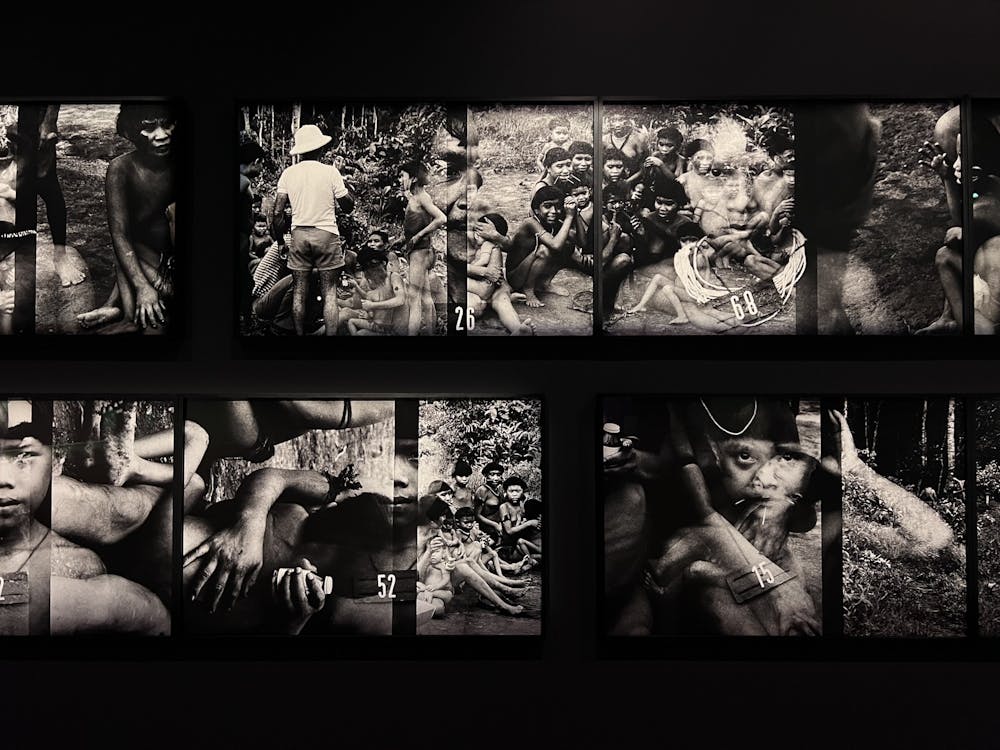“I’m in mourning because my people [are] dying … children are dying for nothing.”
These are the words of Davi Kopenawa, author of “The Falling Sky” and a prominent leader of the Yanomami Indigenous community, which resides on land traversing Brazil and Venezuela. The hardships that the Yanomami people have faced for the past decade result from neglect by the Brazilian and Venezuelan governments and systemic attempts of erasure by the Brazilian government.
On Jan. 31, the University community had the opportunity to hear Kopenawa speak about what he described as the ongoing systematic erasure of the Yanomami people and what it means for the Amazon Rainforest. Kopenawa, who delivered his talk in Portuguese, was joined by Harvard graduate student Ana Laura Boeno Malmaceda, who translated Kopenawa’s words; João Biehl, a Princeton professor of anthropology and the director of the Brazil LAB; and Deborah Yashar, Director of the Princeton Institute for International and Regional Studies.
Kopenawa discussed the “The Yanomami Struggle” exhibit on display at The Shed of New York, which includes drawings and paintings by Yanomami artists, making a point about the planet’s rapid environmental decline and the deterioration of tribal rights, the Yanomami’s among others.
According to Kopenawa, the Yanomami consider themselves to be the primary protectors of the Amazon Rainforest and have taken a central role in its preservation. The destruction of the Amazon, one of Earth’s most important carbon sinks and one of the most biodiverse ecosystems on Earth, would have dramatic environmental consequences. While, according to Kopenawa, the Yanomami have worked tirelessly to safeguard this ecosystem, both the rainforest and the tribe are vulnerable due to the governments Brazil, Venezuela, and other stakeholders seeking to strip the forest of its material goods.
“Stop thinking that our forest is dead and placed here without reason,“ Kopenawa said.
A number of other important activists in the Yanomami movement accompanied Kopenawa as members of the crowd: his son Dário, photographer Claudia Andujar, anthropologists Bruce Albert and Ana Maria Machado, and Indigenous artists and activists like Ehuana Yaira, Morzaniel Ɨramari, and Joseca Mokahesi.
The exhibition draws from a selection of photographs taken by Andujar and drawings by various members of the Yanomami tribe. It spotlights the cultural practices of the Yanomami, such as burial procedures and ritual use of yãkoana powder. In addition, the exhibition reveals the abuse that the Yanomami faced during colonization. A quote from Kopenawa displayed in the exhibition reads, “Our ancestors inhabited the sources of these rivers long before the birth of my fathers … sometimes we are scared that the white people will finish us off.”

When asked how the Princeton community could assist in the efforts to defend the Yanomami, Kopenawa told audience members to write to President Joe Biden to build up support for the Yanomami cause.
Biehl, who moderated Kopenawa’s keynote, echoed Kopenawa’s concerns. “Their land has been raided and their knowledge and values not considered and understood,” Biehl said. “The tragedy the Yanomami are facing is simply unacceptable, and we must join forces to change the predatory course of history.”
According to Biehl, if drawing is the medium by which the Yanomami record and revere the forest, we must continue to prioritize the retelling of their history and stories.
“[We must] grow out of ignorance to defend the forest and its peoples with [the Yanomami], for we too, in Princeton, are ‘in the service of humanity’ and the planet,” Biehl said.

A recording of the “Davi Kopenawa: The Falling Sky and The Yanomami Struggle” event is available online on the Brazil LAB’s YouTube channel. The exhibit, produced by The Shed of New York, is open Feb. 3 through Apr. 16.
The event was a joint effort by a number of departments across Princeton. Co-sponsors include the Department of Art and Archaeology, Princeton University Art Museum, Lewis Center for the Arts, Pace Center for Civic Engagement, High Meadows Environmental Institute, University Center for Human Values, Humanities Council, Program in Latin American Studies, Department of Spanish and Portuguese, Princeton School of Public and International Affairs, and Princeton Institute for International and Regional Studies.
Jaden Sharp is a contributing writer for the Prospect.
Please direct any corrections requests to corrections[at]dailyprincetonian.com.








